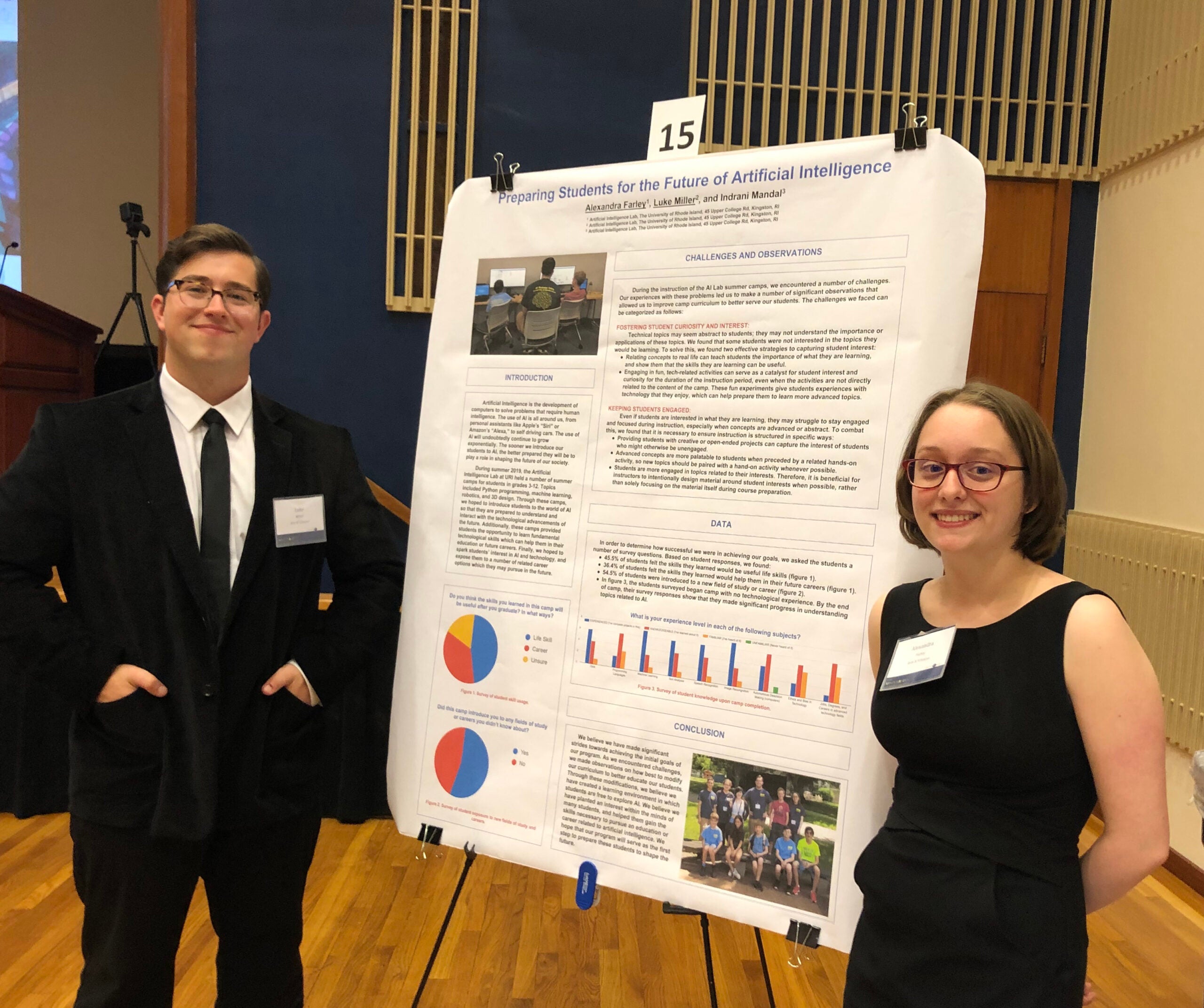KINGSTON, R.I. — October 28, 2019 — When University of Rhode Island seniors Luke Miller and Alex Farley were tasked with creating a curriculum for a young people’s summer camp on artificial intelligence, they didn’t plan on it becoming a research project. However, after an entire summer of educating kids on AI, they realized that they had important findings to share, and the Undergraduate Research Showcase would be the perfect forum.
The camps were designed for students in grade three through high school, were a week long, and ran from late June to late August. The goal was to provide kids ages 8 through 18 with a beginner’s education in AI, and an opportunity to be exposed to careers in the field of technology.
Miller and Farley are student employees in the Artificial Intelligence lab within the Robert L. Carothers Library and Learning Commons, but originally met as teachers’ assistants in a computer science class. Working as TAs was their first exposure to teaching, and they credit this experience with educating them in remaining patient with their students, something they relied on when working with youngsters in the summer program.
Miller and Farley created the curriculum for the camps, and taught them as well. They taught a combined eight camps, and other employees of the AI lab taught three camps. Miller is from Mystic, Connecticut, and is a computer science major. Farley is from Cumberland, R.I. and a computer science and data science double major.
Miller taught lessons about machine learning, and Farley taught students Python, an online program, 3D design, and robotics programming.
For one of their week-long camps, they joined forces with the Oasis, an organization for underprivileged youth ages 8 to 17, to provide them with a free opportunity to gain exposure to AI and potential careers in technology. The participants in this camp had less experience with the technology and concepts, but Miller and Farley found them to be eager learners.
“Our goal was to introduce students to the world of AI and technology, because tech is a huge part of our lives, but also because artificial intelligence is the future,” said Miller. “We thought by introducing them to related topics now, they’ll be better prepared for the future. We wanted to build on the technical skills they’d need if they went into these fields. Also, having an understanding of machine learning can still be beneficial even if you aren’t involved in computer science.”
Soon after beginning the project, they realized they had a larger opportunity at hand, and that was when the research project was born.
It covered an overview of their experiences with the camps, and how successful they were at exposing their students to the world of artificial intelligence, coding, 3D design, and machine learning. Their greatest finding was that students of young ages and lesser exposure to rapidly emerging technology learn better when they are able to apply the technology to their own lives and interests.
“The most important thing is that when you’re trying to teach kids about technology they get distracted easily, so we learned you need to make sure what you’re teaching is somehow related to their personal interests,” noted Farley. “It seems like common sense, but it’s often forgotten. You have to ask ‘how could I teach this material in a way they’d be interested in outside of what we’re learning?’, and give them a frame of reference. Put yourselves in their shoes, give them open-ended concepts, let them pick the subject matter, just use the same knowledge.”
Not only did using the tactics of open-ended learning inspire kids to learn more, it also led to more engagement. Kids were far more receptive to trying to understand high-level topics when they correlated with a project on which they could put their own personal stamp.
According to Miller, many of his students gravitated toward incorporating memes into their projects, as well as music common in pop-culture.
Farley noted that most kids don’t have computer science classes at school, and might not understand what it means to work in those fields. This was a big part of their motivation to introduce young students to new careers and fields of study.
“We sought to fill a hole in the educational system, a way to learn these skills because they may not have them at school,” she said. “The kids who entered the camps with an interest in AI left with a more cemented knowledge, and a desire to continue learning. The kids who enrolled in the free camp had their eyes opened to the possibilities of a career in the field of technology and AI.”
They are making plans to teach more free programs for underprivileged youth throughout their final year at the University. Additionally, the AI lab will hold more summer camps in the summer of 2020.
Learn more about the AI lab.
Lauren Poirier, an intern in the Marketing and Communications Department at URI and public relations and English major, wrote this press release.

